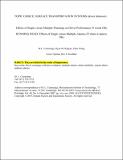| dc.contributor.author | Cummings, M. L. | |
| dc.contributor.author | Kilgore, R. M. | |
| dc.contributor.author | Wang, E. | |
| dc.contributor.author | Tijerina, L. | |
| dc.contributor.author | Kochhar, D. S. | |
| dc.date.accessioned | 2014-09-23T20:51:30Z | |
| dc.date.available | 2014-09-23T20:51:30Z | |
| dc.date.issued | 2007 | |
| dc.identifier.uri | http://hdl.handle.net/1721.1/90288 | |
| dc.description.abstract | Objective: To explore how a single master alarm system affects drivers’ responses when compared to multiple, distinct warnings. Background: Advanced driver warning systems are intended to improve safety, yet inappropriate integration may increase the complexity of driving, especially in high workload situations. This study investigated the effects of auditory alarm scheme, reliability, and collision event-type on driver performance. Method: A 2x2x4 mixed factorial design investigated the impact of two alarm schemes (master vs. individual) and two levels of alarm reliability (high and low) on distracted drivers’ performance across four collision event-types (frontal collision warnings, left and right lane departure warnings, and follow vehicle fast approach). Results: Participants’ reaction times and accuracy rates were significantly affected by the type of collision event and alarm reliability. The use of individual alarms, rather than a single master alarm, did not significantly affect driving performance in terms of reaction time or response accuracy. Conclusion: Even though a master alarm is a relatively uninformative warning, it produced statistically no different reaction times or accuracy results when compared to information-rich auditory icons, some of which were spatially located. In addition, unreliable alarms negatively impacted driver performance, regardless of event type or alarm scheme.
Application: These results have important implications for the development and implementation of multiple driver warning systems. | en_US |
| dc.description.sponsorship | This project was sponsored by the Ford Motor Company. | en_US |
| dc.subject | driver warnings | en_US |
| dc.subject | collision avoidance | en_US |
| dc.subject | multiple alarms | en_US |
| dc.subject | alarm reliability | en_US |
| dc.subject | master alarm | en_US |
| dc.subject | auditory alarms | en_US |
| dc.title | Effects of Single versus Multiple Warnings on Driver Performance | en_US |
| dc.type | Article | en_US |
| dc.identifier.citation | Cummings, M.L., Kilgore, R.M., Wang, E., Tijerina, L., & Kochhar, D.S., Effects of Single versus Multiple Warnings on Driver Performance, Human Factors, 46(6), p. 1097-1106, 2007. | en_US |
